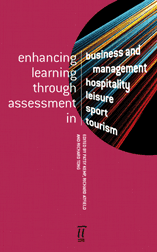Editors’ Foreword
Patsy Kemp, Richard Atfield and Richard Tong
In 2006, the two Higher Education Academy subject centres representing business, management, accountancy and finance, and hospitality, leisure, sport and tourism, decided to collect and publish case studies in which practitioners wrote for practitioners, sharing stories of enhancing employability at their universities. This book became the first in a series using the same case study format, enabling our communities to explore themes current in higher education and reveal the lessons they felt they had learned from their experiences. The next two books, published in 2008 and 2009, covered international learning and student centred learning.
It had long been in our minds that assessment was an issue we should put forward as part of this ‘enhancing’ series of books. Assessment is such an important element in the experience of both staff and students and debate has been growing over how assessment can be used to engage students in learning – assessment for learning rather than assessment of learning. Professor Mantz Yorke, in his introductory chapter talks of ‘the tension between assessment as support of learning and as a means of certifying student achievement’, and this tension is integral to the book. Written by those working directly in learning and teaching for the benefit of their peers, the book weaves together themes which illustrate some of the difficulties of resolving this tension, in a variety of contexts and with a range of approaches.
The first and final case studies come from two CETLs: Assessment Standards Knowledge exchange (ASKe) in Oxford Brookes University and Assessment for Learning (AfL) in Northumbria University. They both highlight the positive impact on learning that engaging students in the process of assessment brings. Allin and Fishwick (Northumbria) showcase an undergraduate Sport Development degree which has adopted a programme-led approach to assessment. O’Donovan (Oxford Brookes Business School) talks of creating an ‘assessment literate’ learning community which contains students who share an understanding of assessment with staff, and who are actively engaged with assessment standards.
The themes of employability and the workplace also run through the book. Work-based learning is directly discussed by two of the case studies, with Beattie at Liverpool John Moores using e-portfolios to develop competences in sports students and Hummel in Heidelberg looking at the nature of assessment strategies and standards for ‘live’ or real world consulting projects in hospitality.
The world of work and its needs thread through several other chapters. Reedy and Mordaunt at the Open University find that new technologies can help in the assessment of some of the difficult skills needed in the workplace, such as collaborative learning. Gordon, then at Queen Margaret University, Edinburgh, discusses the practical introduction of e-portfolios, and the skills of planning and reflection which students must develop to achieve success both with their portfolios and at work. Rushton, Sparshatt and O’Brien at Sheffield Hallam use formative feedback to support students in the acquisition of transferable skills such as research or analysis. Group work, group processes and peer learning feature – from very different angles – in the case studies of Canterbury Christ Church (Garratt) and University of Westminster/London Metropolitan (Pokorny and Griffiths); the former aims to share assessment practices that engage culturally diverse postgraduate students in team working and thus help them appreciate their peers; the latter explores the complexities – and value – of group work assessment practices, with staff paralleling the student experience. Lean and Moizer from the University of Plymouth Business School use oral de-briefing to encourage good reflection on the ‘virtual’ workplace experience of a computer-based business simulation game, as well as considering the challenges of assessing student learning using this approach.
All the case studies contain some element of innovation – be it technological or methodological – for the writers and their institutions, and introduce us to innovations in practice. Anderson’s chapter (Southampton Solent) looks at the development of inclusive assessment methods not fully dependent on the written word; the chapter by Thomas and Tong of the University of Wales Institute, Cardiff (UWIC) investigates an innovative way of managing student dissertations in a complex modular system; Baker at the University of the West of England reflects on the key issues arising from the introduction of a new programme of assessment allowing students to gain from meaningful formative feedback. Neil, Wilson and Tong’s case study (UWIC) contains both technological and methodological innovation – it deals with electronic submission of assessment in sport-related research, and explains how feedback was targeted and individualised for each student.
The research carried out by Hatzipanagos at King’s Learning Institute, King’s College London, highlights again the tension between supporting and measuring learning; those involved in distance learning, where the research took place, have been some of those at the forefront of developing formative assessment systems as they cannot easily give feedback any other way. This chapter shares the research done on how far formative assessment activities are used to improve learning, and how this is perceived by tutors and students.
We acknowledge with gratitude Professor Mantz Yorke who has provided an introductory chapter which deliberates on and extends the issues raised by the authors. We thank all those who have worked hard to provide us with the case studies. We hope that this collection will provide food for thought and debate among the business, management, accountancy and finance, and hospitality, leisure, sport and tourism communities that provided it, and that some of its messages will be relevant and useful further afield.
